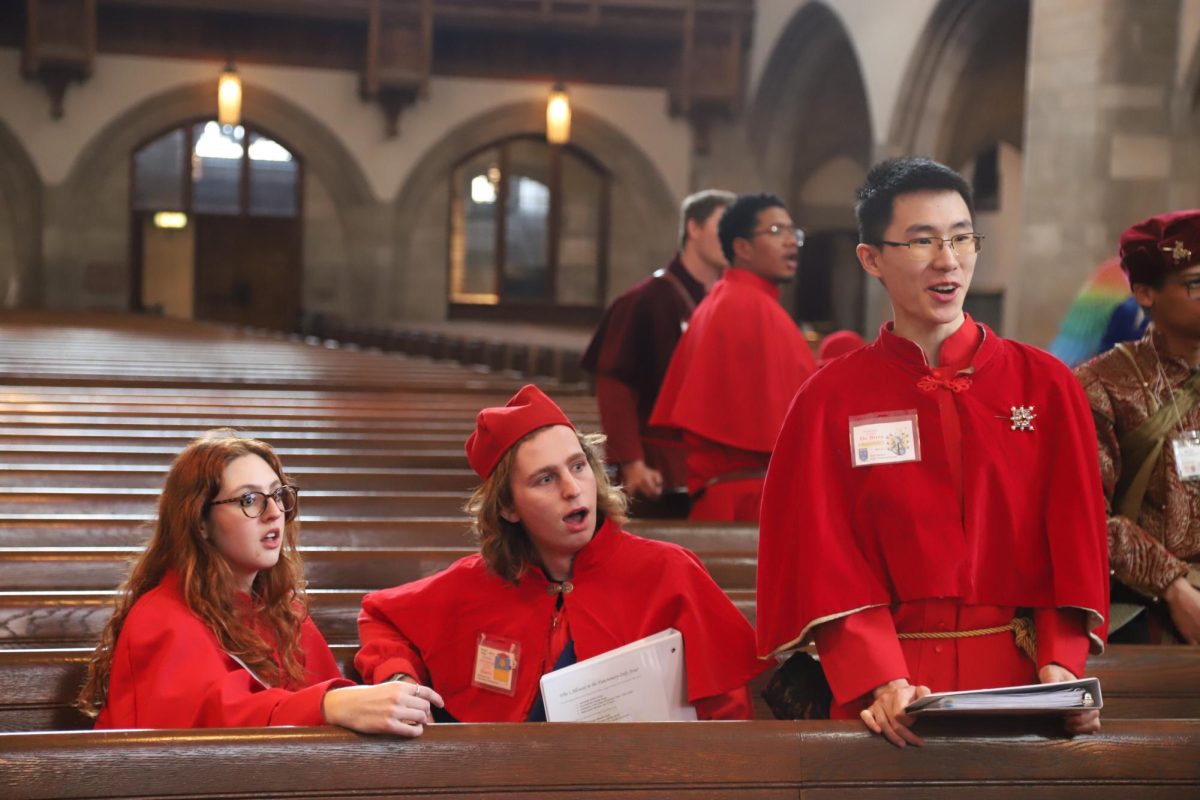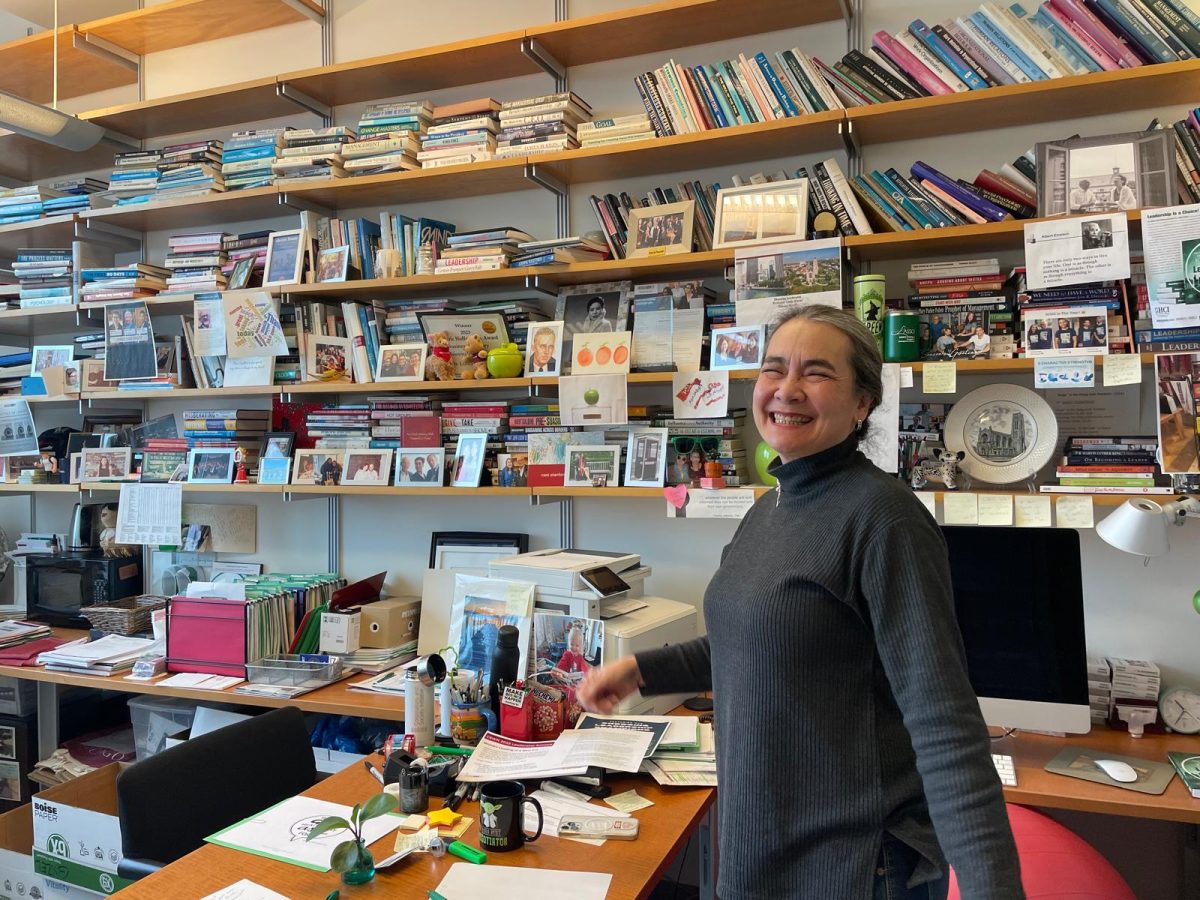For the Class of 2009, last fall was a perfect storm. Students were returning to campus, summer intern employers were making full-time job offers, and on-campus recruitment season was kicking into high gear. And then, Lehman Brothers filed for the largest bankruptcy in American history. The Dow Jones Industrial Average began its long plummet, unemployment rates climbed toward double digits, and the word “recession” became a staple in everyday conversation.
In New York City, Evan Cudworth (A.B. ’09) was attending a consulting and investment banking seminar just after news of Lehman’s collapse broke. He quickly realized that his senior year job prospects had taken a serious hit.
“There had been some last-minute changes in the schedule, and we were no longer convening at the address I had originally received,” Cudworth said. “The morning I flew in, I was walking down Seventh Avenue and there was a dumbstruck group of pinstripe suits clustered around the building where Lehman (and our conference) was originally located. That’s when I knew it was going to be a tough year.”
While last fall’s stock market crash and the difficult economy have been on their minds for over a year, many new graduates only recently started coping with the recession’s effects after their release into the real world last June.
“Our whole class was aware we were graduating in a terrible recession, which certainly made for a fun Senior Week, but things didn’t exactly work out for a lot of my classmates,” Cudworth said.
Exactly how many of Cudworth’s classmates are still looking for work? According to Career Advising and Planning Services (CAPS), 38 percent of graduating students in the Class of 2009 had accepted full-time job offers as of last spring, down from 43 percent the year before. In another contrast, 35 percent of last year’s graduates reported searching for jobs during or after graduation, up from 29 percent in 2008.
But the numbers aren’t necessarily the whole story. In addition to the unemployed, there are graduates who have taken a part-time position to hold them over, or those who have had to accept a job they wouldn’t have considered before the recession. Among those who had to change their plans or still don’t see a paycheck, there is the frustration one would expect. But these grads also see unexpected bright spots as they find ways to put their U of C education to meaningful use.
<hr>
“Sometimes I apply to up to five jobs a day,” said Maria McElwain (A.B. ’09), who lives in Washington, D.C. and works at an unpaid internship for a Senate subcommittee while she looks for a paying job at a government agency, non-profit, or think tank in the capital.
“Non-profits are really struggling and many of them are having to lose valuable staff, so they certainly aren’t hiring,” McElwain said. “As for jobs on the Hill and things like the Foreign Service, nothing has been cut, but there are now far more qualified people applying for them, which makes everything much more competitive.”
For McElwain, being a D.C. native has made her unpaid position easier. And with the free time that accompanies her situation, she has campaigned in the Virginia governor’s race and volunteered for Street Sense, a Washington newspaper that raises awareness about poverty and homelessness.
“It’s easy to devolve into a state of self-pity when your life isn’t going as swimmingly as you always thought it would,” McElwain said. “Volunteering reminds me that there are a lot of things in my life I am very lucky to have, and it also reminds me that while employers may not be willing to pay me for my time, that doesn’t mean it’s not valuable.”
McElwain lives with her parents, which might not seem ideal, but she says she feels lucky. “It’s actually not awkward at all,” she said. “My dad and I commute to work together; my parents and I play tennis every weekend on Sunday night, and fight over The Economist and The New Yorker. I’m sure it will get old after a while but for now, I actually really like spending time with my parents as an adult.”
While McElwain has trouble settling into a potential career, Thomas Manganaro (A.B. ’09), who majored in philosophy, is facing equal difficulty trying to fill the time in his year off before graduate school. Deciding to stay in Chicago with a few friends after graduation, he thought it would be easy to find a short-term way to make some money.
“I figured I’d wing it and trusted I could pick up a full-time job,” Manganaro said.
Trying to find a position as a paralegal, at a press, or in a library, Manganaro sent out more than 60 applications, and didn’t get further than preliminary interviews at a few of the law firms.
“I feel like, if there wasn’t a recession, I wouldn’t have had a problem securing one of the many law firm entry-level legal secretary positions,” Manganaro said. “There are so many of these jobs, and I consider myself quite a good applicant.”
After settling for a part-time gig copyediting a Wicker Park humor magazine for $25 per assignment, Manganaro is grateful for the free time to work on his applications for English Ph.D. programs. However, he worries he won’t have a full-time job with medical benefits before he turns 23 and loses his parents’ coverage in March. With his birthday looming, Manganaro has had to keep the liberal arts major’s worst nightmare in the back of his mind: earning an expensive degree from a prestigious school, only to come out working in restaurants or retail.
“I’ve been telling myself I would only do that when things got really desperate. I suppose I’m getting near that point,” he said. “I’m just putting it off in hopes that I’ll get something better, but I don’t know how long I can do that. I just don’t really want that kind of job. It will definitely become a serious consideration when we get nearer to my birthday.”
Manganaro’s story seems indicative of a wider trend: The recession has forced many graduates still job hunting to become jacks of all trades and broaden the scope of their search for employment. According to CAPS, the number of 2009 College graduates employed in finance or consulting dropped from 34 percent to 23 percent in 2008, demonstrating a shift from past years in the industries Chicago students are entering. After investment banks and consulting firms began trimming their hiring, more students entered teaching, computer technology, health care, and science.
“I basically spread my net wide, networking with as many people as possible and throwing my résumé around,” said Daru Page-Tilahun (A.B. ’09), who recently landed a job with a technology firm in Baltimore. He spent the summer and fall unemployed after becoming dissatisfied with the few opportunities he found in finance, his career of choice at the beginning of his fourth year.
While switching career paths might be an inconvenience, this broadening of interests has had unexpected benefits for some grads.
“I was fortunate to get a job I really like, even though I never had even considered it before,” Page-Tilahun said.
Cudworth has the same story. After spending last fall and winter looking for opportunities in consulting, marketing, or as a paralegal, he took an offer last spring from the Office of College Admissions. Cudworth admits staying on campus hadn’t exactly been on his radar.
“I had worked in Admissions part-time in the summer of 2007 and really enjoyed the people in the office,” Cudworth said. “They all used to give me a hard time about how they knew I’d end up working there. I was set on proving them wrong.”
Yet just a few months into his new job, Cudworth is relishing where he ended up. He said that with the economy still struggling, his tenure might not have been a sure thing even if he had landed a job in consulting or another market-dependent field last year.
“In retrospect, this was a great decision,” Cudworth said. “Right after college I just know I would have been miserable taking a competitive or entry-level job with little security that might not have led anywhere.”
<hr>
With fewer students than usual employed post-graduation, CAPS stepped up its efforts over the summer to help grads combat one of the worst job markets in years. After reaching out individually to every student that reported being on the hunt for a job, they provided special programming and walk-in days in addition to the free-for-life services that CAPS already offers.
According to CAPS Director Meredith Daw, her office’s most significant action was a program that contacted Chicago alumni in various regions, putting them in touch with job-seekers from that area and asking to them to consider employing fellow Maroons. While updated employment figures are not yet available, Daw credits this program with smoothing out the impact of the recession and helping bring employment levels among graduates to figures comparable to previous years.
“It was less of a drop than our peer institutions,” Daw said of the dip in employment. “Our goal is to make sure all our students have plans, but we didn’t know what to expect. We thought it could be a more significant drop, but it wasn’t. We really credit our alumni base and we’re really thankful for them.”
“CAPS is broadening the alumni network, which I think is the best way to job search,” Cudworth said. “Most of my leads and offers, including my current job, came through that.”
Despite this and many other positive reviews, other jobless alumni cited outdated contacts in the Alumni Careers Network Database and ignorance at CAPS about region-specific job searches as obstacles in their quest for employment.
“I can only speak about looking for a job in D.C., but there are a lot of things I’ve figured out myself, or gotten advice about from co-workers and former colleagues, that I would have liked CAPS to have been able to tell me in June,” McElwain said, noting that CAPS seemed unaware of Washington-specific resources like industry listhosts, or how to craft the unique “Knowledge, Skills, and Abilities” form required by the federal government.
As for the Class of 2010’s prospects, Daw is optimistic. Despite national unemployment at over 10 percent, it seems that, at least on campus, things are looking up.
“Fall recruiting numbers are looking really good,” Daw said. “Things are looking better than last year.”








